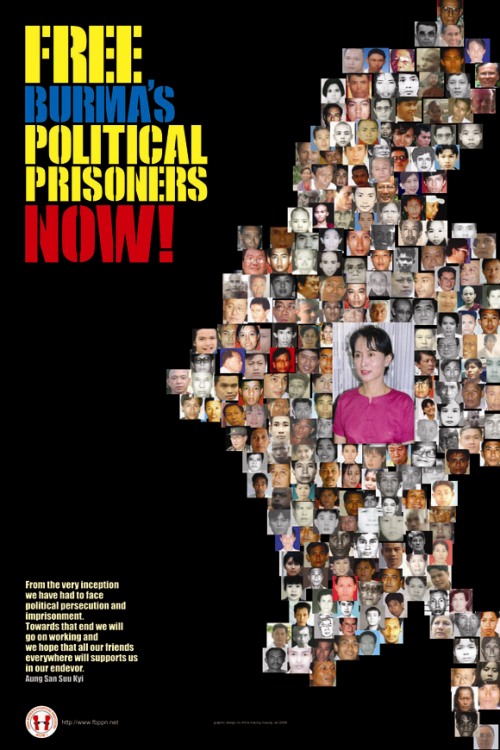 After hearing of her release from the ruling military junta, the beaming 65-year-old opposition leader appeared outside her dilapidated lakeside mansion in the former capital Rangoon and waved to thousands of jubilant supporters.
After hearing of her release from the ruling military junta, the beaming 65-year-old opposition leader appeared outside her dilapidated lakeside mansion in the former capital Rangoon and waved to thousands of jubilant supporters.
Police have removed the traditional barricades from around her villa that had kept the people away during her detention.
"Unity is important for us to move ahead," she said after tasting freedom for the first time in seven and a half years, her latest term of house arrest. She has spent 15 of the last 21 years in detention, being a thorn on the side of the military generals, who have ruled the country for half a century.
Don’t stay silent
Suu Kyi spoke to her supporters on Saturday. On Sunday she urged thousands of supporters in her first major speech since being freed from house arrest to tell her what they want, suggesting she was would pursue a political role.
Suu Kyi on Saturday also spoke by telephone with her younger of two sons in neighbor ing Thailand. Kim Aris was trying to get a visa to visit his mother for the first time in 10 years. He lives in Britain and has been repeatedly denied visas.
ing Thailand. Kim Aris was trying to get a visa to visit his mother for the first time in 10 years. He lives in Britain and has been repeatedly denied visas.
Suu Kyi’s house arrest was extended in August last year over a bizarre incident in which an American swam uninvited to her lakeside home. A court found she had broken a law protecting the state against "subversive elements."
When she was last released in 2002, she drew huge crowds wherever she went.
Her release Saturday came at a critical juncture, as a new government has not yet been formed since the November 7 elections, the first in two decades.
In 1990 elections, the party of Suu Kyi, the daughter of Myanmar’s independence hero General Aung San, swept to victory but it was not allowed to take power.
The NLD was disbanded by the junta for boycotting last week’s elections, which critics say was marked by fraud and other irregularities aimed at keeping the military in power.
In the latest polls, the pro-junta political party, the Union Solidarity and Development Party (USDP), secured a majority of seats in both houses of Parliament, according to the latest official results.
A senior junta official said there were no strings attached to Suu Kyi’s release.
"She is completely free – there are no conditions at all," the official told AFP, speaking on condition of anonymity.
-The release is good news. The regime is as bad as always
In a press release, the Norwegian Burma Committee, is pleased with Aung San Suu Kyi’s release, but stresses that it does not imply a softening of the regime. Aung San Suu Kyi herself has said that her freedom is not of most importance. When she was released in 2002 she said: -My release should not be looked at as a major breakthrough for democracy. For all people in Burma to enjoy basic freedom – that would be the major breakthrough.
No one should put any hope in that the release is anything else than a well thought out strategy from the junta in an attempt to moderate international criticism of the fake election 7 November.
Now that Aung San Suu Kyi finally is free the Norwegian Burma Committee is very concerned about her security. Last time the opposition leader was out of house arrest her convoy was attacked by pro junta groups 30 May 2003 during a trip in northern Burma. The attack has been named the Depayin massacre as 70 persons were killed and more than 100 arrested, included Aung San Suu Kyi.
 – The international community must demand a guarantee for her security. Aung San Suu Kyi is still loved by the people and therefore the regime’s worst enemy, says Inger Lise Husøy, right, director of the Norwegian Burma Committee.
– The international community must demand a guarantee for her security. Aung San Suu Kyi is still loved by the people and therefore the regime’s worst enemy, says Inger Lise Husøy, right, director of the Norwegian Burma Committee.
Release all prisoners of conscience
Aung San Suu Kyi was awarded the 1990 Rafto Prize for Human Rights for her peaceful struggle under the military dictatorship. Her non-violent struggle for democracy was internationally r ecognised when she received the Nobel Peace Prize in 1991.
ecognised when she received the Nobel Peace Prize in 1991.
She was one of more than 2,200 political prisoners, including prisoners of conscience, currently being held in deplorable conditions for simply exercising their right to peaceful protest.
“While Daw Aung San Suu Kyi’s release is certainly welcome, it only marks the end of an unfair sentence that was illegally extended, and is by no means a concession on the part of the authorities”, said Amnesty International’s Secretary General, Salil Shetty.
“The fact remains that authorities should never have arrested her or the many other prisoners of conscience in Myanmar in the first place, locking them out of the political process."
World hails release
World leaders and international human rights and freedom of expression organisations welcomed Suu Kyi’s new found freedom but asked the junta to release the remaining more than 2,000 political prisoners.
Article 19 Executive Director Dr Agnes Callamard told "Today she has been freed. But tomorrow, we must once again confront, demand, remind, and campaign. For let there be no doubt about it, this major step must be a first step only. It has to be followed by many more. Standing with Aung San Suu Kyi and her supporters, we will work to ensure that these next steps are taken, so that the Burmese people may also be freed."
Freedom Now President Jared Genser said Suu Kyi’s release alone was "virtually meaningless until the junta enters into an irreversible process of dialogue resulting in national reconciliation between the junta, the NLD, and ethnic groups and a restoration of democracy to Burma."
"I welcome the release of fellow Nobel laureate Aung San Suu Kyi and extend my appreciation to the military regime in Burma. I extend my full support and solidarity to the movement for democracy in Burma and take this opportunity to appeal to freedom-loving people all over the world to support such non-violent movements.
I pray and hope that the government of the People’s Republic of China will release fellow Nobel laureate Liu Xiaobo and other prisoners of conscience who have been imprisoned for exercising their freedom of expression." said H.H. The Dalai Lama today.
"The United States welcomes her long overdue release," U.S. President Barack Obama said in a statement, calling Suu Kyi "a hero of mine." "It is time for the Burmese regime to release all political prisoners, not just one."
British Prime Minister David Cameron also said her freedom was long overdue. "Freedom is Aung San Suu Kyi’s right. The Burmese regime must now uphold it," he said, according to foreign news ageny reports.
U.N. Secretary-General Ban Ki-moon said Suu Kyi’s "dignity and courage in the face of injustice have been an inspiration to many people around the world."
French President Nicolas Sarkozy said “any obstacle to her freedom of movement or expression would constitute a new and unacceptable denial of her rights."
Human rights groups also welcomed Suu Kyi’s release but some remained suspicious over the junta’s motives.
"She should not have been under arrest in the first place," said T. Kumar, Amnesty International’s director of advocacy. "Obviously, we are going to push for the release of the remaining political prisoners and urge the junta to stop all human rights abuses in the country, including against minority ethnic groups."
HRH Oslo, based on the Norwegian Burma Committee, Radio Free Asia, Article 19, the Norwegian Tibet Committee, Amnesty International, Amnesty International Norway and Rafto Foundation information.
Related links:
Burma: elections without free expression
Burma: no visas for foreigners before election, NLD announces boycott


